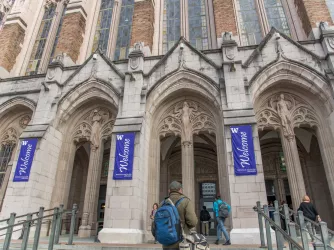Table of Contents
Victory for First Amendment on Campus: Federal Court Grants Temporary Restraining Order Against Free Speech Zone, Permitting 'Empty Holster' Protest
In a victory for First Amendment rights on campus, a federal district court in Texas has granted two students at Tarrant County College (TCC) a temporary restraining order prohibiting TCC from censoring an "empty holster" protest scheduled for next week.
The court's decision to grant the order came two days after the students filed a motion requesting a temporary restraining order, arguing that by enforcing its "free speech zone" policy to quarantine next week's protest, TCC would violate the students' First Amendment rights. The request for a temporary restraining order accompanied a lawsuit seeking the permanent dismantling of TCC's free speech zone, and was filed by Fort Worth attorney Karin Cagle and the American Civil Liberties Union of Texas in cooperation with FIRE.
In granting the temporary restraining order, the federal court held that the students would suffer "immediate and irreparable injury" if TCC were allowed to restrict the protest event, due to the free speech zone policy's use of a permit system that contains no guidelines or standards for decision-making as well as the lack of access provided to traditional public forums such as sidewalks, streets, and park areas. The court's opinion declared that the student-plaintiffs Clayton Smith and John Schwertz, Jr. must not be prevented by the college from "wearing empty holsters, wearing t-shirts depicting empty holsters, discussing handgun regulations, and distributing pamphlets on handgun regulation in traditional public-forum areas including, but not limited to, public streets, sidewalks, and common or park areas."
United States District Judge Terry R. Means wrote:
Smith and Schwertz certainly intend to convey a particularized message by their wearing of empty holsters—that they oppose Texas law and TCC regulations that prohibit students from possessing concealed handguns on campus, and that such laws leave students unprotected. And there is a great likelihood that the empty holsters will be understood as conveying this message, particularly given the circumstances in which Smith and Schwertz seek to wear them: as part of an organized, nationwide protest in which participants will wear t-shirts depicting empty holsters, discuss their opposition to laws and school regulations prohibiting the possession of concealed weapons on campus, and distribute pamphlets on the issue.
Smith and Schwertz have satisfied the other requirements for securing a temporary restraining order regarding the restrictions on their ability to speak in traditional public forums as well. They have shown that they face a substantial threat of irreparable harm if the injunction is not granted in that they are in the untenable position of forgoing their First Amendment rights or engaging in their desired speech and thereby subjecting themselves to disciplinary action by TCC. See Elrod v. Burns, 427 U.S. 347, 373-74 (1976) ("The loss of First Amendment freedoms, for even minimal periods of time, unquestionably constitutes irreparable injury."). They have further shown that the threatened injury to them—nability to engage in protected speech or risk disciplinary action—outweighs any potential harm to TCC and Hadley. Smith and Schwertz seek only to engage in a peaceful demonstration in areas traditionally considered public forums. Moreover, they note that several similar demonstrations have taken place on college campuses across the country without incident. Finally, injunctive relief will not undermine the public interest, but will serve it, in that it will be in protection of First Amendment rights without any significant detrimental impact on TCC's objective of educating its students. Cf. Valley v. Rapides Parish Sch. Bd., 118 F.3d 1047, 1056 (5th Cir. 1997) (noting that the public interest is undermined by allowing unconstitutional conduct to stand but is served by ensuring a school district acts in accordance with the Constitution).
However, the court declined to extend the temporary restraining order to allow students to wear empty holsters inside of TCC classrooms and adjacent hallways, ruling that Smith and Schwertz, Jr.'s motion did not demonstrate a "substantial likelihood of success on this aspect of their claim" because TCC may be successful in arguing that it may regulate in-classroom speech differently than other speech on campus. FIRE does not believe that TCC will ultimately be successful in that argument.
Today's opinion is a huge victory for Clayton, John, and free speech on campus, particularly because the legal bar for issuing a temporary restraining order is quite high—which indicates that the court reads the plaintiffs' case as having a substantial likelihood of success on the merits. In today's ruling, the district court agreed with FIRE's argument that by limiting student expression to a tiny segment of campus, TCC unconstitutionally restricts students' First Amendment rights where they should be freest—the public university campus.
As a result of this victory, Clayton, John, and their fellow students at Tarrant County College will be able to proceed with next week's protest. FIRE hails this great victory for student speech rights, and we look forward to the students' lawsuit challenging the free speech zone on its face. The first hearing on the full suit is scheduled for November 16.
Of course, we will have more to say on The Torch on this case as it proceeds.
Recent Articles
FIRE’s award-winning Newsdesk covers the free speech news you need to stay informed.

FIRE’s defense of pollster J. Ann Selzer against Donald Trump’s lawsuit is First Amendment 101

High schoolers: Become a voice for tomorrow, today!

University of Washington alumni seek to revive the spirit of free inquiry
